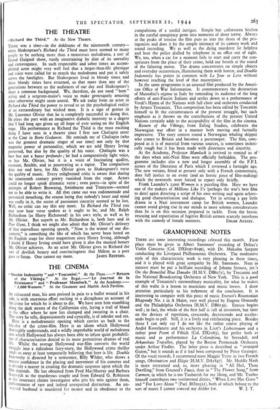THERE was a time—in the doldrums of the nineteenth century—
when Shakespeare's Richard the Third must have seemed to many people to be nothing more than a monstrous melodrama, a sort of Grand Guignol show, vastly entertaining by dint of its unreality and extravagance. In such respectable and sober times an accom- plished actor might very well feel that a larger-than-life physique and voice were called for to match the melodrama and put it safely across the footlights. But Shakespeare lived in bloody times and these bloody times have returned, so that more than any of the generations between us the audiences of our day and Shakespeare's share a common background. We, therefore, do not need " ham " acting and a sergeant-major's voice to make grotesquely amusing what otherwise might seem unreal. We ask today from an actor in Richard the Third the power to reveal to us the psychological reality of an extraordinary but wicked man. It is a sign of genius in Mr. Laurence Olivier that he is completely successful in doing this. He plays the part with an imaginative diabolic intensity to a degree that I had long ago given up all hope of ever seeing on the English stage. His performance as Richard the Third is the most exciting thing I have seen in a theatre since I first saw Chaliapin enter as the Czar in Boris Godunov. He reminds me of Chaliapin (who was the greatest dramatic singer of our time) not only by that magnetic power of personality; which we are told Henry Irving possessed, but • also by the quality of his voice. Chaliapin was a bass but not a basso profundo ; he had a comparatively light voice, so has Mr. Olivier, but it is a voice of fascinating quality, resonant, flexible, and as penetrating as a rapier. The comparison does not end here, for Mr. Olivier gives to Shakespeare's verse the quality of music. Every enlightened critic is aware that during the nineteenth century poetry vanished from the stage. Actors could no longer speak dramatic verse ; even poets—in spite of the attempts of Robert Browning, Swinburne and Tennyson—seemed not to be able to write it. All that came out was rodomontade and parsonical mouthing, the reason being that nobody's heart and mind was really in it, the secret of passionate sincerity seemed to be lost. Well, no critic can say this any more. In Richard the Third you may now hear verse spoken as it ought to be, and Mr. Ralph Richardson (as Harry Richmond) in his own style, as well as by Mr. Olivier. But superb as Mr. Richardson is, both here and in Peer Gynt, I think we might also admit that Mr. Olivier's delivery of that marvellous opening speech, "Now is the winter of our dis- content," is something the like of which has never been heard on the English stage for sheer magnetism since Henry Irving, although I doubt if Henry Irving could have given it also the musical beauty Mr. Olivier achieves. As an actor Mr. Olivier gives to Richard the sort of devilish beauty and convincingness that Milton as a poet gave to Satan. One cannot say more. JAMES REDFERN.


























 Previous page
Previous page